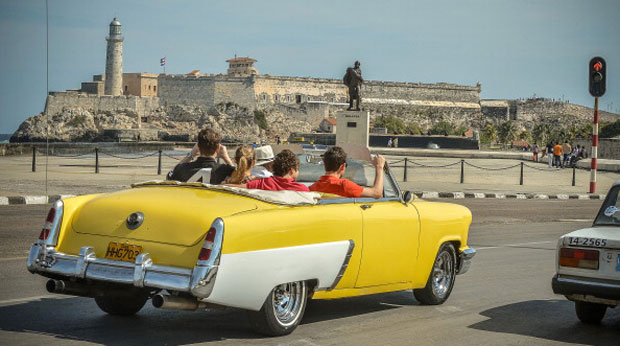Cuba: Why it's wrong to mourn passing of island's old US cars
Vintage cars are 'symbols of oppression' and only tourists will mourn their consignment to scrap heap

A free daily email with the biggest news stories of the day – and the best features from TheWeek.com
You are now subscribed
Your newsletter sign-up was successful
VINTAGE American cars are as synonymous with Cuba as salsa music and a well-rolled cigar. But sweeping changes to the country's import laws may have spelled the beginning of the end for the country's fleet of ancient Studebakers and Oldsmobiles.
For almost 50 years, Havana's streets have been jammed with the kind of big, chrome-covered cars that are consigned to museums and collectors' garages elsewhere in the world. They were made prior to the 1959 revolution that swept Fidel Castro to power. Cubans were forced to keep them on the road due to "tight domestic controls and US sanctions" that prevented most people from buying imported vehicles The Guardian reports.
But in the latest of a series of economic reforms, the council of ministers headed by Raul Castro, Fidel's brother, has opened up the car market to all citizens". As a result, one of Cuba's "most distinctive anachronisms" is under threat.
The Week
Escape your echo chamber. Get the facts behind the news, plus analysis from multiple perspectives.

Sign up for The Week's Free Newsletters
From our morning news briefing to a weekly Good News Newsletter, get the best of The Week delivered directly to your inbox.
From our morning news briefing to a weekly Good News Newsletter, get the best of The Week delivered directly to your inbox.
While foreign tourists may mourn the disappearance of the ancient cars, they're missing the point, writes The Guardian's Mark Wallace. He says the vehicles are "icons of oppression" that should be scrapped.
Describing their demise as a tragedy is "patronising nonsense," writes Wallace. If Cubans had the choice they would have consigned them to the scrap heap years ago. The only reason they didn't is that "the communist dictatorship that rules them did not allow it".
Wallace adds: "The motor museum driving Cuba's roads each day might seem quaint to tourists, who can go back to their air-conditioned, reliable and safe modern cars when their holiday is over – in reality the sight is a symptom of the way in which dictatorship runs down the lives of those forced to labour beneath it."
Many Cubans are certainly keen to upgrade their cars. But as AP reports, the price of new imported vehicles may prevent many of them doing so. When prospective buyers visited Havana's car showrooms on Friday – the first day the new import laws came into force – they found "sharply hiked prices, some of them light years beyond all but the most well-heeled islanders", AP says.
A free daily email with the biggest news stories of the day – and the best features from TheWeek.com
A new Kia Rio hatchback that costs $13,600 in the US will cost a Cuban motorist $42,000. Meanwhile, a Peugeot 508 sedan, the most luxurious of which lists for the equivalent of about $53,000 in the UK, costs $262,000 in Havana.
It will be up to the Cuban government to reduce the prices because it has a monopoly on sales and decides the market value of vehicles.
Guillermo Flores, a 27-year-old computer engineer told AP: "Let's see if a revolutionary worker who lives honourably on his salary can come and buy a car at these prices. This is a joke on the people."
-
 ‘States that set ambitious climate targets are already feeling the tension’
‘States that set ambitious climate targets are already feeling the tension’Instant Opinion Opinion, comment and editorials of the day
-
 Mixing up mixology: The year ahead in cocktail and bar trends
Mixing up mixology: The year ahead in cocktail and bar trendsthe week recommends It’s hojicha vs. matcha, plus a whole lot more
-
 Labor secretary’s husband barred amid assault probe
Labor secretary’s husband barred amid assault probeSpeed Read Shawn DeRemer, the husband of Labor Secretary Lori Chavez-DeRemer, has been accused of sexual assault
-
 Trump’s fuel blockade puts Cuba in crisis mode
Trump’s fuel blockade puts Cuba in crisis modeIN THE SPOTLIGHT Plummeting tourism, scrambling airlines and rolling blackouts are pushing Cuban society to the brink
-
 Epstein files topple law CEO, roil UK government
Epstein files topple law CEO, roil UK governmentSpeed Read Peter Mandelson, Britain’s former ambassador to the US, is caught up in the scandal
-
 Iran and US prepare to meet after skirmishes
Iran and US prepare to meet after skirmishesSpeed Read The incident comes amid heightened tensions in the Middle East
-
 Israel retrieves final hostage’s body from Gaza
Israel retrieves final hostage’s body from GazaSpeed Read The 24-year-old police officer was killed during the initial Hamas attack
-
 China’s Xi targets top general in growing purge
China’s Xi targets top general in growing purgeSpeed Read Zhang Youxia is being investigated over ‘grave violations’ of the law
-
 Panama and Canada are negotiating over a crucial copper mine
Panama and Canada are negotiating over a crucial copper mineIn the Spotlight Panama is set to make a final decision on the mine this summer
-
 Why Greenland’s natural resources are nearly impossible to mine
Why Greenland’s natural resources are nearly impossible to mineThe Explainer The country’s natural landscape makes the task extremely difficult
-
 Iran cuts internet as protests escalate
Iran cuts internet as protests escalateSpeed Reada Government buildings across the country have been set on fire